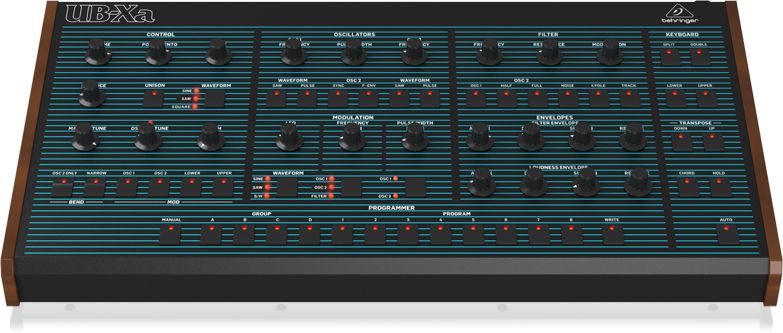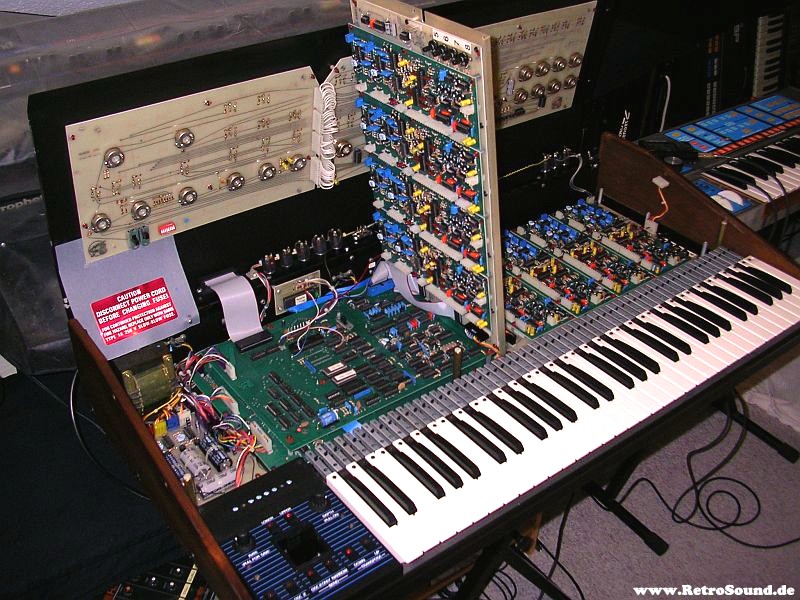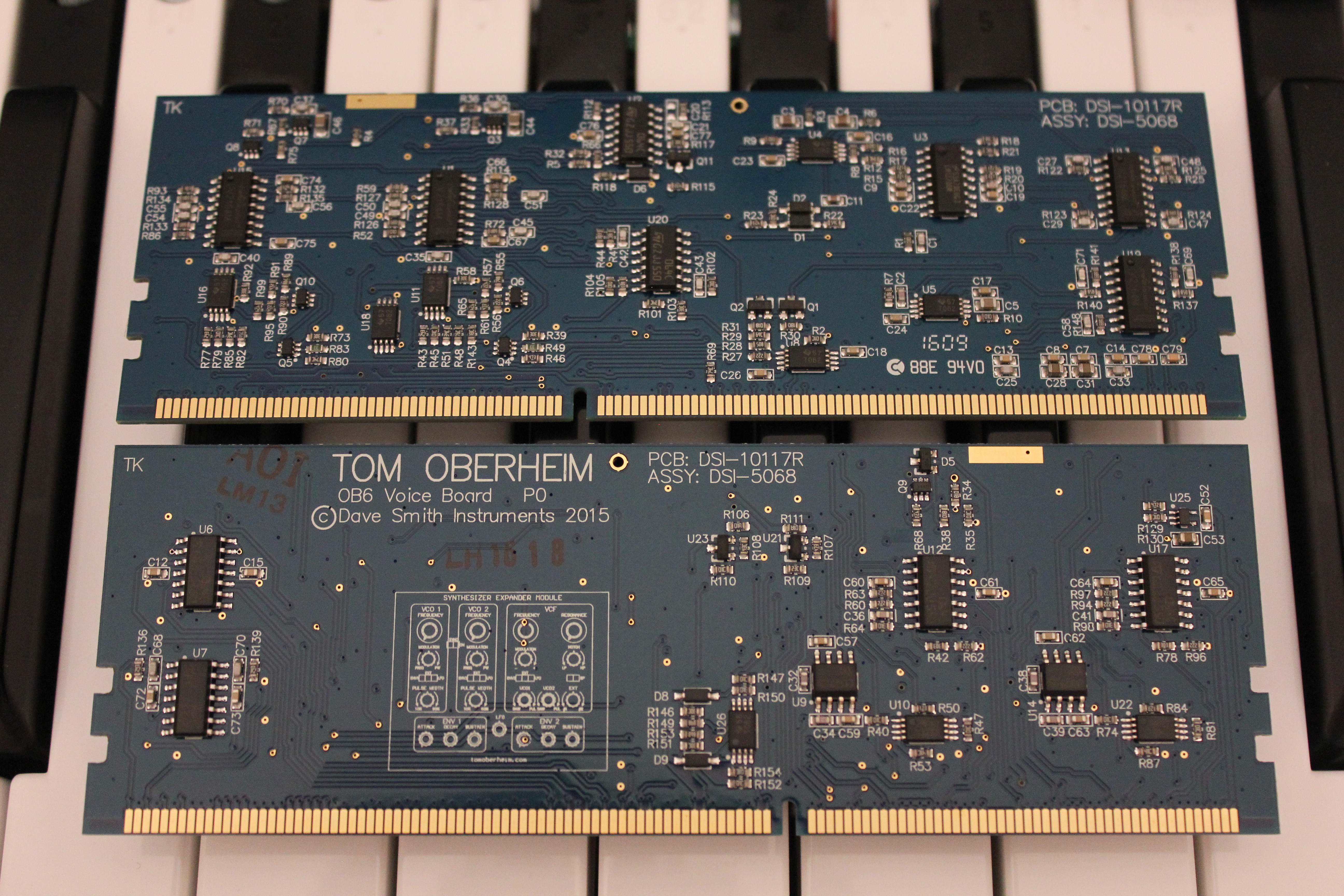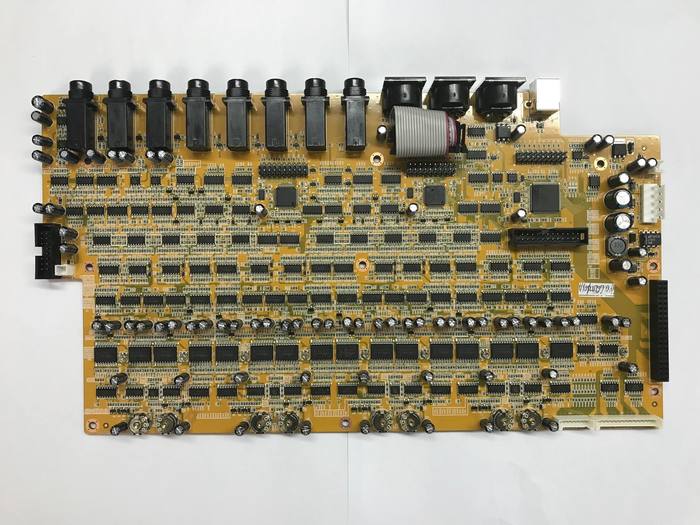Behringer UB-Xa
- 608 réponses
- 73 participants
- 51 193 vues
- 84 followers
tomheck
794
Posteur·euse AFfolé·e
Membre depuis 19 ans
Sujet de la discussion Posté le 08/01/2018 à 16:02:22Behringer UB-Xa
And the next...


https://www.gearslutz.com/board/electronic-music-instruments-and-electronic-music-production/1196469-ub-xa-synthesizer.html
"Dear all,
As many of you know, synths have been my passion for the past 40 years. Sometime ago I have set the goal for Behringer to bring back some of the loved analog synth jewels from the past.
Please allow me to share some thoughts with you and apologies if this is a longer thread.
Does this make any commercial sense?
Every company has to earn money in order to survive, and so do we. However, since we are privately owned, we don’t really care about the next quarter’s result or "shareholder value" since it is our philosophy to reinvest everything we earn.
This gives us the tremendous freedom to work on projects that can only be described as “labor of love” as they might not yield any financial gains. This is why we embark on these synth projects; some of them might not sell in high quantities and frankly to us it doesn’t really matter.
Many of our competitors spend all of their effort on marketing to make you believe in analog synth emulation simply because it’s much easier and cheaper to assemble a DSP chip on a PCB board rather than building products with thousands of analog components and deal with the manufacturing complexity plus expensive manual calibration processes.
However we at Behringer and Midas believe in the passion to revive these analog jewels and the fun these projects create for our team - which to us is worth everything.
Why we believe in analog?
We at Behringer do not believe in “virtual analog”, VST’s or other creative names for digital sound emulations as we are of the firm opinion that you cannot replicate true analog sound through digital technology, and there are many technical reasons for this. To be very clear, this doesn’t mean digital synths or VST’s can't sound great, but it is just something we don’t believe in.
Our passion and emotions are with true analog synths and our goal is to bring back the authentic sound of original designs from the period of the 60’s to the 80’s. In order to achieve the exact same sound, we will use the same circuitry and where possible the same components, however we will apply modern manufacturing technologies to make these instruments affordable, mass producible and reliable for the long-term use.
In many cases we will also remanufacture obsolete components if we feel they are relevant to the sound. In short we will not spare any effort in order to capture the spirit of these synths as it is all about authenticity.
Why do we make this announcement?
For the first time in our 30 year history, we have decided to completely open up our company and share every step of the development process with you so you can ask questions while we will be seeking your opinions.
In fact we want you to participate in this end-to-end process so we can learn from you, but also for you to fully understand how such a synth is developed and manufactured.
What is the UB-Xa synthesizer?
Over the past years we have done a lot of research both on forums but also through interviews with professional musicians in order to understand what the most sought after synths and drum machines are, but also what people feel the sound signatures of these synths are and why people feel so strongly about them.
When it comes to poly-synths the overwhelming request is a rebirth of the Oberheim OB-Xa.
Today I officially announce that we have decided that we will develop and produce an authentic OB-Xa clone which we call the UB-Xa. As you can imagine, this is a very complex and time-consuming project and at this stage we won’t be able to tell you when the instrument will be available in the market or what it will cost.
Since this is more a labor of love than a commercially viable project, our engineers can’t work fulltime on this synth and will use some of their free time, hence the project will likely take more than 12 months.
Most importantly, our goal is to make it an absolute authentic sounding instrument and offer it at a truly affordable price - but you know this already.
Because of its high complexity, we have assigned this project to our most experienced team which is the Midas team in Manchester, UK. These synth nuts and super-smart engineers - under the leadership of Pete and Rob - were also the ones who developed the successful DeepMind12.
So what’s next?
In around one week from now, Pete and Rob will post our first video and share some thoughts with you. Our intention is to not only post videos on a regular basis but also write articles and publish them on our social media pages so you can follow this project.
Now that we have decided on the project, next is the discussion around the basic concept, the feature set and also the building blocks including potential component choices. In the near future we will be able to show you the first “bread boards” of the sound engine and hopefully let you hear some sound samples.
Next will be PCB and mechanical designs, followed by hand- and tool made samples. And then of course we will be sharing the exciting mass production where we will be showing the production setup and testing plus quality control processes. And if you’re not yet bored by then, we can also show you the packaging and shipping process.
The team in Manchester and I are very excited about this project and we hope that many of you will chime in and participate.
And one more thing - once we’re nearing shipping, we will be raffling off some free units among you as a token of appreciation.
May the fun begin
Uli"


https://www.gearslutz.com/board/electronic-music-instruments-and-electronic-music-production/1196469-ub-xa-synthesizer.html
"Dear all,
As many of you know, synths have been my passion for the past 40 years. Sometime ago I have set the goal for Behringer to bring back some of the loved analog synth jewels from the past.
Please allow me to share some thoughts with you and apologies if this is a longer thread.
Does this make any commercial sense?
Every company has to earn money in order to survive, and so do we. However, since we are privately owned, we don’t really care about the next quarter’s result or "shareholder value" since it is our philosophy to reinvest everything we earn.
This gives us the tremendous freedom to work on projects that can only be described as “labor of love” as they might not yield any financial gains. This is why we embark on these synth projects; some of them might not sell in high quantities and frankly to us it doesn’t really matter.
Many of our competitors spend all of their effort on marketing to make you believe in analog synth emulation simply because it’s much easier and cheaper to assemble a DSP chip on a PCB board rather than building products with thousands of analog components and deal with the manufacturing complexity plus expensive manual calibration processes.
However we at Behringer and Midas believe in the passion to revive these analog jewels and the fun these projects create for our team - which to us is worth everything.
Why we believe in analog?
We at Behringer do not believe in “virtual analog”, VST’s or other creative names for digital sound emulations as we are of the firm opinion that you cannot replicate true analog sound through digital technology, and there are many technical reasons for this. To be very clear, this doesn’t mean digital synths or VST’s can't sound great, but it is just something we don’t believe in.
Our passion and emotions are with true analog synths and our goal is to bring back the authentic sound of original designs from the period of the 60’s to the 80’s. In order to achieve the exact same sound, we will use the same circuitry and where possible the same components, however we will apply modern manufacturing technologies to make these instruments affordable, mass producible and reliable for the long-term use.
In many cases we will also remanufacture obsolete components if we feel they are relevant to the sound. In short we will not spare any effort in order to capture the spirit of these synths as it is all about authenticity.
Why do we make this announcement?
For the first time in our 30 year history, we have decided to completely open up our company and share every step of the development process with you so you can ask questions while we will be seeking your opinions.
In fact we want you to participate in this end-to-end process so we can learn from you, but also for you to fully understand how such a synth is developed and manufactured.
What is the UB-Xa synthesizer?
Over the past years we have done a lot of research both on forums but also through interviews with professional musicians in order to understand what the most sought after synths and drum machines are, but also what people feel the sound signatures of these synths are and why people feel so strongly about them.
When it comes to poly-synths the overwhelming request is a rebirth of the Oberheim OB-Xa.
Today I officially announce that we have decided that we will develop and produce an authentic OB-Xa clone which we call the UB-Xa. As you can imagine, this is a very complex and time-consuming project and at this stage we won’t be able to tell you when the instrument will be available in the market or what it will cost.
Since this is more a labor of love than a commercially viable project, our engineers can’t work fulltime on this synth and will use some of their free time, hence the project will likely take more than 12 months.
Most importantly, our goal is to make it an absolute authentic sounding instrument and offer it at a truly affordable price - but you know this already.
Because of its high complexity, we have assigned this project to our most experienced team which is the Midas team in Manchester, UK. These synth nuts and super-smart engineers - under the leadership of Pete and Rob - were also the ones who developed the successful DeepMind12.
So what’s next?
In around one week from now, Pete and Rob will post our first video and share some thoughts with you. Our intention is to not only post videos on a regular basis but also write articles and publish them on our social media pages so you can follow this project.
Now that we have decided on the project, next is the discussion around the basic concept, the feature set and also the building blocks including potential component choices. In the near future we will be able to show you the first “bread boards” of the sound engine and hopefully let you hear some sound samples.
Next will be PCB and mechanical designs, followed by hand- and tool made samples. And then of course we will be sharing the exciting mass production where we will be showing the production setup and testing plus quality control processes. And if you’re not yet bored by then, we can also show you the packaging and shipping process.
The team in Manchester and I are very excited about this project and we hope that many of you will chime in and participate.
And one more thing - once we’re nearing shipping, we will be raffling off some free units among you as a token of appreciation.
May the fun begin
Uli"
Vinnie Johnson
477
Posteur·euse AFfamé·e
Membre depuis 11 ans
551 Posté le 20/03/2019 à 22:07:11
Pfff, à vu d'oeil on pourrait mettre trois cartes mères...
0
Coyote14
16569
Modérateur·trice thématique
Membre depuis 21 ans
552 Posté le 20/03/2019 à 22:10:17
Encore un faux problème. Qu'est-ce que cela peut bien faire objectivement, que la boite soit pleine ou vide? A part chauffer moins, peut être?
6
Anonyme
553 Posté le 20/03/2019 à 22:22:09
Je veux bien d'une boite 3 fois plus vide si mon portefeuille reste 3 fois plus plein 
2
Push-Pull
21317
Vie après AF ?
Membre depuis 21 ans
554 Posté le 20/03/2019 à 22:25:55
Coyote, ça chauffe pas tant que ça en fait (rien à voir avec le radiateur du JP-8).
Mais pour ceux qui aiment quand c'est bien rempli, ici l'OBXa original:

Mais pour ceux qui aiment quand c'est bien rempli, ici l'OBXa original:
3
chapolin
10680
Professionnel·le de l’audio
Membre depuis 21 ans
555 Posté le 20/03/2019 à 23:40:17
Comme quoi la miniaturisation a fait des progrès, certains y voient du mal et d'autres du bien ...
0
ZeeByeZon
1919
AFicionado·a
Membre depuis 22 ans
556 Posté le 21/03/2019 à 10:35:33
C'est top, ça fait aussi un clavier plus léger à transporter. Il me tente bien pour la scène.
Note: les Clavia (Nord lead, modular...) ont toujours été pratiquement vides aussi...
Note: les Clavia (Nord lead, modular...) ont toujours été pratiquement vides aussi...
0
alex.d.
5811
Je poste, donc je suis
Membre depuis 10 ans
557 Posté le 21/03/2019 à 10:59:26
Citation de ZeeByeZon :
Note: les Clavia (Nord lead, modular...) ont toujours été pratiquement vides aussi...
Normal, les Clavia sont numériques. Les circuits numériques sont particulièrement compacts.
Alors qu'un poly analo, ça demande pas mal de composants, comme on peut le voir sur la photo d'OBXa original. C'est pour ça qu'il est surprenant de voir son "clone" l'UB-Xa avec un tout petit circuit.
0
Push-Pull
21317
Vie après AF ?
Membre depuis 21 ans
558 Posté le 21/03/2019 à 11:42:46
Alex: ça n'a rien d'étonnant, c'est juste les composants qui sont devenu plus petits. Et avec les circuits imprimés qui sont devenus multicouches, on gagne une place considérable.
D'ailleurs si il avait fallu réaliser l'équivalent du board numérique d'un Clavia en 1979, il aurait fallu une belle quantité de mètres carrés pour y arriver !
D'ailleurs si il avait fallu réaliser l'équivalent du board numérique d'un Clavia en 1979, il aurait fallu une belle quantité de mètres carrés pour y arriver !
1
Vinnie Johnson
477
Posteur·euse AFfamé·e
Membre depuis 11 ans
559 Posté le 21/03/2019 à 12:49:26
Et pourquoi les composants sont plus gros sur le dave smith ob-6 ? 
0
[ Dernière édition du message le 21/03/2019 à 12:49:42 ]
Push-Pull
21317
Vie après AF ?
Membre depuis 21 ans
560 Posté le 21/03/2019 à 13:06:50
C'est expliqué par SW dans son test:
Là c'est juste une voix:

Alors que le clone de Behri utilise à fond des rééditions des puces 3340 pour les VCO, 3320 pour le filtre (qui n'offre d'ailleurs pas toutes les possibilités multimodes du DSI) 3360 pour le VCA, etc.
Ca permet de limiter un max les composants et donc la place. Son board peut ainsi se permettre d'y héberger toutes les huit voix:

Citation :
L’OB-6 est un synthé analogique polyphonique 6 voix, dont le son est basé sur des composants analogiques discrets (VCO, VCF, VCA). Pas le moindre circuit intégré (type SSM/CEM/DSI-120) pour générer les sons.
Là c'est juste une voix:

Alors que le clone de Behri utilise à fond des rééditions des puces 3340 pour les VCO, 3320 pour le filtre (qui n'offre d'ailleurs pas toutes les possibilités multimodes du DSI) 3360 pour le VCA, etc.
Ca permet de limiter un max les composants et donc la place. Son board peut ainsi se permettre d'y héberger toutes les huit voix:

2
- < Liste des sujets
- Charte


